
Mantidae is one of the largest families in the order of praying mantises, based on the type species Mantis religiosa; however, most genera are tropical or subtropical. Historically, this was the only family in the order, and many references still use the term "mantid" to refer to any mantis. Technically, however, "mantid" refers only to members of the family Mantidae, and not the 14 remaining families of mantises. Some of the most recent classifications have promoted a number of the mantid subfamilies to the rank of family, e.g. Iridopterygidae, Sibyllidae, Tarachodidae, Thespidae, and Toxoderidae, while other classifications have reduced the number of subfamilies without elevating to higher rank.
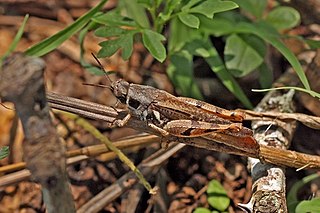
The subfamily Catantopinae is a group of insects classified under family Acrididae. Genera such as Macrotona may sometimes called "spur-throated grasshoppers", but that name is also used for grasshoppers from other subfamilies, including the genus Melanoplus from the Melanoplinae.

Sjöstedt's greenbul is a species of songbird in the bulbul family, Pycnonotidae. It is found in western and central Africa.
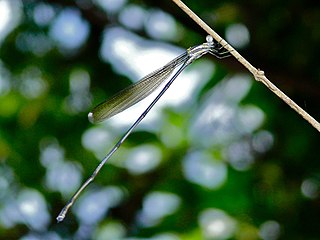
Mecistogaster is a genus of large Neotropical damselflies in the family Coenagrionidae, commonly known as helicopter damsels. There are eleven species distributed from Mexico to Argentina.
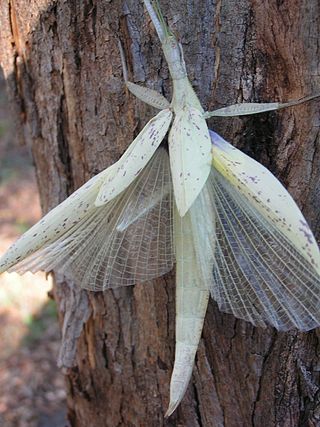
Tropidoderus childrenii, the Children's stick insect, was first described in 1833 by Gray.

Archimantis is a genus of praying mantis found in Australia. These species are ranging from 150 mm to 180mm, and can be quite aggressive when full adult.

Macrotona is a genus of grasshoppers in the family Acrididae and tribe Catantopini. It includes eight described species and around 35 undescribed species. They are often found in association with spinifex.

Cryptotermes is a genus of termites in the family Kalotermitidae. It is one of the economically most significant genera of drywood termites.

Neotermes is a genus of termites in the Kalotermitidae family. The genus was first described by Nils Holmgren in 1911, and the type species is Neotermes castaneus. All species are obligate nesters of wood.

Acrotylus is a genus of grasshopper in the family Acrididae and the type genus of the tribe Acrotylini.

Anacridium is a genus of "tree locusts" or "bird grasshoppers" belonging to the subfamily Cyrtacanthacridinae.
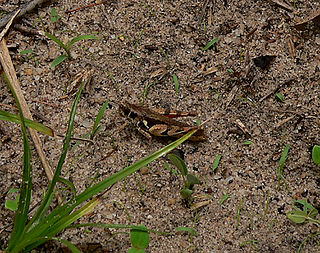
Catantopini is a tribe in the subfamily Catantopinae, a group of grasshoppers found in Africa, Asia and Australia.

Sipyloidea is a genus of stick insects of the family Lonchodidae. Species have been recorded from India, China, Indochina, through to Australasia. The genus was described by Brunner von Wattenwyl in 1893.

Valanga is a genus of "bird grasshoppers" in the subfamily Cyrtacanthacridinae. Species are found from the Indian subcontinent through southeast Asia and the Korean peninsula to Australia and the Pacific islands.

Clonaria is an Asian genus of stick insects belonging to the tribe Gratidiini.
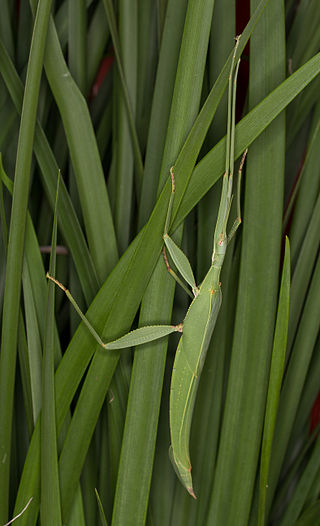
The Tropidoderinae are a sub-family of stick insects in the family Phasmatidae: genera are found in Africa, tropical Asia and Australasia.

The Hierodulinae are a subfamily of praying mantids, originally used by Brunner von Wattenwyl. It was restored as part of a major revision of mantid taxonomy, and now contains genera previously placed elsewhere in the family Mantidae.
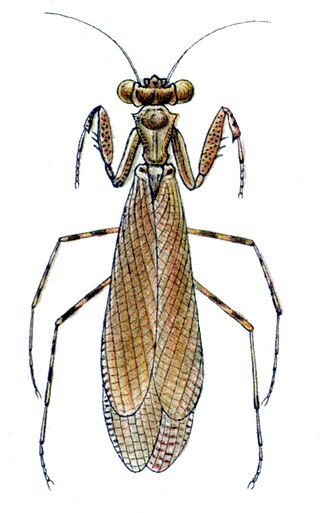
Phthersigena is an Australasian genus of praying mantids: in the subfamily Fulciniinae and tribe Paraoxypilini. It is one of several genera containing certain species called "unicorn mantids", due to a process on their heads.
Pachymorpha is a genus of phasmids belonging to the family Diapheromeridae.
Scionecra is a genus of Asian stick insects in the tribe Necrosciini, erected by Heinrich Hugo Karny in 1923. Species have been recorded from: China, Vietnam, Malesia through to Australia.


















